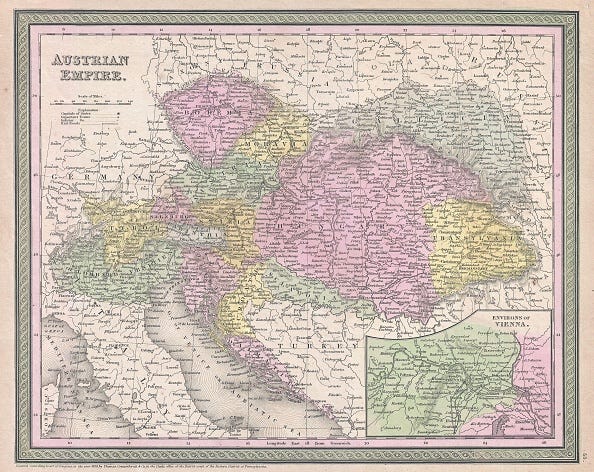The Habsburg monarchy (Austria) comes late to Ukrainian history, but with a fascinating legacy, and an important contribution. The Habsburgs ruled the original empire on which the sun never set, and were arguably the most important family in modern European history. This lecture summarizes their history before the partitions of Poland in the late eighteenth century that brought Galicia under Habsburg power. The name “Galicia” like so many other things was actually a Habsburg invention; it just designated with slightly spurious Latinate grace the lands Vienna took from Poland. (The Ukrainian name is “Halychyna,” which has an ancient source.) The eastern part of these territories was inhabited by speakers of Ukrainian (and Polish and Yiddish and other languages); over the course of the nineteenth century, and especially at its end, it became very important that they were ruled from Vienna rather than from Petersburg. The modern Ukrainian movement, which began in the Russian Empire, continued, after Russian imperial oppression, in Habsburg lands. The liberal and increasingly democratic character of Habsburg rule created a special incubator for Ukrainian politics and culture.
The video is here and the podcast version is here or here.
Reading:
Rudnyts'ky, "Ukrainians in Galicia under Habsburg Rule"
Amelia Glaser, "Between Nation and Class: Nataliya Kobrynska's Jewish Characters," in Yohanan Petrovsky-Shtern and Antony Polonsky, eds., Polin, vol. 26, 2014, 183-195.
Plokhy, Gates of Europe, chapter 15.
John-Paul Himka, Galician Villagers and the Ukrainian National Movement in the Nineteenth Century, Edmonton: CIUS, 1988, 1-36.
Snyder, Red Prince, entire.
Terms:
Galicia
1020 Habsburgs build Habischtsburg.
Rudolf of Habsburg, elected Holy Roman Emperer 1273
Otakar Premysl II, defeated 1278
1356 promulgation of Golden Bull
Habsburgs out of the HRE, just Austrian lords, not among seven electors
1359 Promulgation of Privilegium Maius
Council of Constance 1414-1415
Jan Hus
452 leaders pf Czech nation send a manifesto denouncing the execution.
Sigismund of Luxembourg
Jan Zizka
Albert V of Habsburg
Matthias Corvinus r. Hungary 1458-1490.
Emperor Maximilian
Władysław Jagiello
1526 Battle of Mohács. Brother in law inherits thrones of Bohemia and Hungary. Habsburgs become central European power, in theory. Pays off 1683-1699.
1699 Karlovitz/1700 end of Spanish line.
1740 Maria Theresia begins reign
1756-1763 Seven-Years' War
First partition of Poland 1772
1791 Constitution of 3 May.
Union of Brest, 1596
Joseph II (1780-1790): enlightened absolutism
Franz (1792-1835): unenlightened absolutism
Age of Metternich
Ferdinand, feebleminded and epilectic 1835-1848.
Ukrainian National Council.
Franz Joseph
1866 Austro-German war, 1867 Ausgleich
1861: end of serfdom in Russian Empire
Mykhailo Hrushevs'kyi





Prof. Snyder: Any recommendations for history of Habsburg monarchy?
I have this book but still am curious if Prof. Snyder has a recommendation for a history of the Hapsburgs (the recent biography of Maria Theresa covers much).